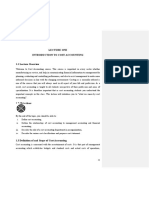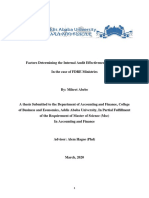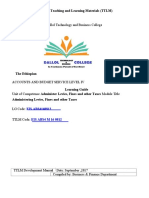Cost Course Outlime
Cost Course Outlime
Uploaded by
UserCopyright:
Available Formats
Cost Course Outlime
Cost Course Outlime
Uploaded by
UserOriginal Title
Copyright
Available Formats
Share this document
Did you find this document useful?
Is this content inappropriate?
Copyright:
Available Formats
Cost Course Outlime
Cost Course Outlime
Uploaded by
UserCopyright:
Available Formats
Haramaya University
College of Business and Economics
Department of Accounting and Finance
Department Accounting & Finance
Program BA degree in Accounting & Finance
Module Cost & managerial Accounting
Number/Title
Module Code ACFN-3030
Objective of the This module will cover cost accumulation concepts and techniques for Product and Service
module Costing and Planning and Control, as well as Non-routine Managerial Decisions. Modern
management accountants are not only concerned with how cost data are transformed into
cost accounting information but more importantly how to use cost accounting information
to aid managerial goals. It is the case, however, that one cannot effectively use cost
information without a good understanding of how various cost accounting information are
generated.
The module should develop the student's understanding, skill, and analytical ability in cost
and management accounting to the level where he or she can function effectively (and
efficiently) as a professional cost and management accountant in industry, public
accounting, management consulting, government, or personal business management.
Course code AcFn3031
Course Title Cost & management Accounting I
ETCTS Credits 5
Contact Hours 3
(per week)
Lecturer Getahun D. (Msc)
Course Objectives Upon the successful completion of this module, students should be able to:
& Competences to Use various classifications to analyze costs within the organization.
be Acquired Describe and apply the principles relating to the costing of the different
resource inputs into a business.
Demonstrate output costing methods appropriate to a variety of different
businesses.
Illustrate and evaluate absorption, marginal costing, activity-based costing
methods and other management cost accounting methods and techniques.
Apply and analyze different types of activity-based management tools through the
preparation of estimates.
Describe, illustrate and comment on the planning and control uses of
standard costing, budgeting and variance analysis
Course Cost accounting course concerns with fundamental cost concepts, behavior, and analysis
Description and the use of cost information to develop superior decision making process and outputs.
This course introduces the production, communication, and the use of accounting
information within the context of business activities.
.
WEEKS Course Contents
1. Overview of Cost and Management Accounting
2WEEKS 1,1 Objectives of Cost & Management Accounting
{1ST&2ND } 1.2 Cost and management accounting in comparison with
financial accounting: their purposes, the role of cost
accounting as part of a management information system,
and the need for both financial as well as non-financial
information
1.3 Cost classification concepts and terms, such as:
Direct and indirect costs,
Fixed and variable costs,
Period and product costs,
Controllable and uncontrollable costs,
Avoidable and unavoidable costs,
“Sunk” costs,
Budgeted, standard and actual costs and their
comparisons and analyses
1.4 The use of linear, curvilinear and step functions and how
their calculations are used to analyze cost behavior
1.5 The concepts of cost units, cost centers and profit centers
2:.Cost determination: The costing of resource inputs
3 WEEKS 2.1 Materials
Accounting for stock (inventory)movements
{3RD- 5TH } Determination of optimum purchase quantities
Identification of accounting for stock losses
2.2 Labor
The difference between direct and indirect labor
Types of labor remuneration methods
2.3 Overheads
Overhead cost analyses
The apportionment and absorption of overhead costs,
including allocation of service department costs.
Accounting for the over- and under absorption of costs
IAS 2 inventories on Overhead allocations
2.4 Recording of costs and schedule of costs of products.
2. Costing methods: The costing of resource outputs
3.1 Job order, batch and contract costing methods
5 WEEKS Characteristics of each method
Accounting for direct and indirect costs, including
{6TH - 10 TH } the treatment of waste, scrap, spoilage and re work
costs,
3. The Process and Operation or service costing methods:
Characteristics of the process costing method,
Identification and use of appropriate cost units,
Valuation of process transfers and workin-process
using equivalent units of production and based on
FIFO and average costing methods,
Accounting for normal and abnormal losses and
gains, joint and by-products
Scope of operation or service costing,
Identification of appropriate cost units,
Considerations relating to the collection,
classification and ascertainment of costs
4. Cost Allocation
5.1 Explain the notions of ‘overhead costs’, ‘indirect
costs’, ‘direct costs’, ‘traceable costs’ and
‘allocated costs’.
2 WEEK 5.2 Explain how accountants choose to create ‘cost
centres or ‘cost pools’ in which to gather together
{11TH & 12tTH} cost data.
5.3 Explain why and how costs may be allocated from
one cost pool or centre to another.
5.4 Support department cost allocation
5.5 Joint and By-products
5.6 Common cost allocation
5. Activity-Based Costing and Management
2 WEEKS 6.1 Activity-based costing; use of cost drivers and
{12TH & 14TH } activities
6.2 Activity Based Costing for Customer Profitability
6.3 Activity Based Management
Assessment/ The evaluation scheme will be as follows:
Evaluation Component Weight coverage
Test 1 15% Chapter 1 &5
Test 2 15% Chapter 3 & 4
Assignment 1 5% Chapter 1 &2
Assignment 2 5% Chapter 3-6
Quiz 1 5%
Quiz 2 5%
Final Exam 50% All chapters
Work load in hours
Hours Required
Total
Assess Tutor Self- Assign Advi Hrs ECTS
Lectures Lab ments ials Studies ment sing
64 - 22 12 64 - - 162 6
Text Book:
Text and reference Horngren, Foster, &Datar. Cost Accounting: A
books Managerial Emphasis. 9th Ed. 1997
Horngren, Sunden& Stratton. Introduction to
Management Accounting. 11th Ed. 1999
Reference Books
C.T Homgren, Introduction to Management Accounting
4th to 8 th editions, 1999 USA
C.T. Homgren, Cost Accounting: A Managerial Emphasis
5th to 8th ecitionsprentice Hall Inc. 1982 to 1994
Homgren, foster, &Datar, Cost Accounting A Managerial
Emphasis. 10 thEcition
L.E. Heitger Managerial Accounting 1th and 2 nd editions,
McGraw Hill , 1998, India
GetuJemaneh, Management Accounting 1996.
Ray H.Garrison, Managerial Accounting. 6th edition
You might also like
- Assignment 1 - 2021 - 2022Document4 pagesAssignment 1 - 2021 - 2022Assya El MoukademNo ratings yet
- IKEA Catalogue 2012Document189 pagesIKEA Catalogue 2012nguyễn thăng vănNo ratings yet
- Capital Med in BriefDocument4 pagesCapital Med in BriefE BNo ratings yet
- Rift Valley University Bale Robe Campus Department of Accounting and Finance Course OutlineDocument3 pagesRift Valley University Bale Robe Campus Department of Accounting and Finance Course Outlinebikilahussen100% (1)
- Bule Hora University Collage of Business and Economics Department of Accounting and FinanceDocument4 pagesBule Hora University Collage of Business and Economics Department of Accounting and Financenahu tube100% (1)
- Module 1 PDFDocument13 pagesModule 1 PDFWaridi GroupNo ratings yet
- Decision Making and Relevant Information: Learning ObjectivesDocument14 pagesDecision Making and Relevant Information: Learning ObjectivesKelvin John RamosNo ratings yet
- CHAPTER 2 Joint VentureDocument5 pagesCHAPTER 2 Joint VentureAkkamaNo ratings yet
- Jimma University College of Business and Economics Department of AccountingDocument14 pagesJimma University College of Business and Economics Department of AccountingHunde100% (1)
- Cost and Management Accounting I Chapter I: Fundamentals of Cost AccountingDocument19 pagesCost and Management Accounting I Chapter I: Fundamentals of Cost AccountingFear Part 2No ratings yet
- Financial Management IDocument58 pagesFinancial Management Igelango124419No ratings yet
- Discuss Briefly The Historical Developments of That Contributed For The Development of Operations ManagementDocument7 pagesDiscuss Briefly The Historical Developments of That Contributed For The Development of Operations ManagementEyayaw AshagrieNo ratings yet
- Wollo University: Department of Management, Master of Business Adminstration ProgramDocument29 pagesWollo University: Department of Management, Master of Business Adminstration ProgramTesfamariam AbateNo ratings yet
- Habtamu Bishaw AsresDocument12 pagesHabtamu Bishaw AsresSolomon NegaNo ratings yet
- Chapter 5 - Decision Making and R-Information-sem II 2018Document16 pagesChapter 5 - Decision Making and R-Information-sem II 2018Yonas100% (1)
- Chapter V: Relevant Information and Decision MakingDocument37 pagesChapter V: Relevant Information and Decision MakingBereket DesalegnNo ratings yet
- Lecture # 12Document19 pagesLecture # 12bwcs1122No ratings yet
- Budget Administration Performance AnalysDocument70 pagesBudget Administration Performance Analysseblewongel demissie100% (1)
- Demonstration ProblemsDocument3 pagesDemonstration Problemsnega guluma100% (1)
- Chapter One Accounting For Public SectorDocument10 pagesChapter One Accounting For Public SectorFasil Million100% (1)
- Exercise Principles Accounting IDocument5 pagesExercise Principles Accounting Imerkineh fantaNo ratings yet
- A) Chart of Accounts: "Universal Garage" Which Is Organized As A Sole Proprietorship. The Business Is EstablishedDocument7 pagesA) Chart of Accounts: "Universal Garage" Which Is Organized As A Sole Proprietorship. The Business Is Establisheddereje solomonNo ratings yet
- Mihret AbebeDocument94 pagesMihret AbebeLemlem TesfayeNo ratings yet
- Anteneh Getachew Final Approved Project MBADocument74 pagesAnteneh Getachew Final Approved Project MBAchiroNo ratings yet
- Set D (True or False), Question and Answers Chapter 20 - BudgetingDocument2 pagesSet D (True or False), Question and Answers Chapter 20 - BudgetingJohn Carlos DoringoNo ratings yet
- ECONOassessment of Budget Preparation and Performance EvaluationDocument50 pagesECONOassessment of Budget Preparation and Performance EvaluationMubarak100% (1)
- Audit II 7new - 3Document15 pagesAudit II 7new - 3Muktar Xahaa100% (1)
- MA 300 CLASS NOTES - Quantitative Aids in Budgeting and CPADocument12 pagesMA 300 CLASS NOTES - Quantitative Aids in Budgeting and CPAFrst-Ngwazi Prince Christopher MandaNo ratings yet
- Ambo Univeristy: Collage of Business and Economics Department of Marketing ManagmentDocument30 pagesAmbo Univeristy: Collage of Business and Economics Department of Marketing Managmentfeyisa abebeNo ratings yet
- FMA Assignment 02Document4 pagesFMA Assignment 02Chala oll irra100% (1)
- Cma August 2013 SolutionDocument66 pagesCma August 2013 Solutionফকির তাজুল ইসলামNo ratings yet
- Assignment IIDocument4 pagesAssignment IIAfifa TonniNo ratings yet
- Introduction 3Document24 pagesIntroduction 3Zinashbizu LemmaNo ratings yet
- Chapter 6 Activity Based CostingDocument1 pageChapter 6 Activity Based CostingKaren Cael100% (1)
- Advanced FA I - Chapter 02, BranchesDocument137 pagesAdvanced FA I - Chapter 02, BranchesUtban AshabNo ratings yet
- Sop 98-5Document14 pagesSop 98-5chanti0999No ratings yet
- The Effectiveness of Training Program in The Case of Ethio-TelecomDocument98 pagesThe Effectiveness of Training Program in The Case of Ethio-Telecomnati100% (1)
- Chapter 13 Budgetary System: 1. ObjectivesDocument15 pagesChapter 13 Budgetary System: 1. ObjectivescherikokNo ratings yet
- @4 Auditing and Assurance Services - WSUDocument125 pages@4 Auditing and Assurance Services - WSUOUSMAN SEIDNo ratings yet
- Training, Teaching and Learning Materials (TTLM) : EIS ABS4160812 EIS ABS4 M 16 0812Document10 pagesTraining, Teaching and Learning Materials (TTLM) : EIS ABS4160812 EIS ABS4 M 16 0812NabuteNo ratings yet
- Fainal Paper - MekashuDocument54 pagesFainal Paper - Mekashubereket nigussieNo ratings yet
- Unit Five: Relevant Information and Decision MakingDocument39 pagesUnit Five: Relevant Information and Decision MakingEbsa AbdiNo ratings yet
- Final Thesis For Publishing Zenaw HailemariamDocument79 pagesFinal Thesis For Publishing Zenaw HailemariamTesema GenetuNo ratings yet
- Review The Ethiopian Procurement ProclamationDocument4 pagesReview The Ethiopian Procurement ProclamationAbraham100% (1)
- Emebet Tesema The Proposal Focuses On Effectiveness of Inventory Management Practice in CaseDocument29 pagesEmebet Tesema The Proposal Focuses On Effectiveness of Inventory Management Practice in Caseyedinkachaw shferawNo ratings yet
- Prepared by Coby Harmon University of California, Santa Barbara Westmont CollegeDocument38 pagesPrepared by Coby Harmon University of California, Santa Barbara Westmont Collegee s tNo ratings yet
- Minyichel BayeDocument86 pagesMinyichel BayeMilkias MenaNo ratings yet
- Unit 6 - Capital Structure and LeverageDocument12 pagesUnit 6 - Capital Structure and LeverageGizaw BelayNo ratings yet
- Salih Jemal EditDocument47 pagesSalih Jemal Editmusa shandu100% (1)
- INDUSTRIAL ATTACHMENT HANDBOOK FinalDocument35 pagesINDUSTRIAL ATTACHMENT HANDBOOK FinalMoses FukizaNo ratings yet
- Accounting For Foreign Currency TransactionsDocument2 pagesAccounting For Foreign Currency Transactionskeith niduelanNo ratings yet
- Definition of Cost and CostingDocument6 pagesDefinition of Cost and CostingNahidul Islam IUNo ratings yet
- Unit 9: Inventory /purchase AuditDocument5 pagesUnit 9: Inventory /purchase AudittemedebereNo ratings yet
- FM 2 Module FinalDocument153 pagesFM 2 Module Finalhabtamu100% (1)
- Uniform CostingDocument2 pagesUniform CostingSyed Mujtaba HassanNo ratings yet
- Project Integration Management Pmbok 5th Edition PPT File v1.1Document71 pagesProject Integration Management Pmbok 5th Edition PPT File v1.1Danlami ChieNo ratings yet
- Audit Feam WoDocument12 pagesAudit Feam Woamanawite TeshomeNo ratings yet
- Chapter Three: Accounting For General Capital Assets & Capital Project FundsDocument46 pagesChapter Three: Accounting For General Capital Assets & Capital Project FundsTilahun MikiasNo ratings yet
- Auditing I Chapter 2Document63 pagesAuditing I Chapter 2Yitera Sisay100% (1)
- The Effects of Taxation on Multinational CorporationsFrom EverandThe Effects of Taxation on Multinational CorporationsRating: 5 out of 5 stars5/5 (1)
- Cost I Course OutlineDocument3 pagesCost I Course OutlineIliyas IsakeNo ratings yet
- PACX User GuideDocument20 pagesPACX User GuideKewyn FerreiraNo ratings yet
- Ref. No. 257, S. 2019 - Submission of Participants To The Division Teacher Induction Program (TIP) 2019 PDFDocument17 pagesRef. No. 257, S. 2019 - Submission of Participants To The Division Teacher Induction Program (TIP) 2019 PDFChristine SalientesNo ratings yet
- First YearDocument19 pagesFirst Yearapi-3797997No ratings yet
- Esr Series User Manual 1.2.0 EngDocument109 pagesEsr Series User Manual 1.2.0 EngSrdjan MilenkovicNo ratings yet
- Recent Applications of Phased Array Inspection For Turbine Components and Welded StructuresDocument8 pagesRecent Applications of Phased Array Inspection For Turbine Components and Welded Structureskoohestani_afshinNo ratings yet
- Sommer DDocument2 pagesSommer Dapi-295336875No ratings yet
- 24 A - Review - On - The - Effect - of - Soil - Compaction - and - ItsDocument23 pages24 A - Review - On - The - Effect - of - Soil - Compaction - and - ItsLiv CBNo ratings yet
- Entrep 12 Marketing MixDocument14 pagesEntrep 12 Marketing MixZyrichNo ratings yet
- Sew EurodriveDocument232 pagesSew EurodrivetujiohNo ratings yet
- PhysicalSci12 Q1 Mod4 Week7 Sources of Energy v3Document33 pagesPhysicalSci12 Q1 Mod4 Week7 Sources of Energy v3Corazon ReymarNo ratings yet
- Installment Payment AgreementDocument1 pageInstallment Payment AgreementBaisy VillanozaNo ratings yet
- Tennis Leg Gastrocnemius Injury Is A Far More Comm-1Document4 pagesTennis Leg Gastrocnemius Injury Is A Far More Comm-1jasonoytumandukNo ratings yet
- Backyard BiologistDocument2 pagesBackyard Biologistapi-234287636No ratings yet
- 136 Yos Online Yabanci Uyruklu Ogrenci Sinavi TR YosDocument5 pages136 Yos Online Yabanci Uyruklu Ogrenci Sinavi TR Yosusmanmughal127790No ratings yet
- Fire Safety Easy Quiz - BrainPOP JRDocument1 pageFire Safety Easy Quiz - BrainPOP JRleduylamNo ratings yet
- FMDS0281Document67 pagesFMDS0281Sandeep YadavNo ratings yet
- Cheat Codes For Pokemon Mystery Dungeon - Explorers of Time On Nintendo DS - Codejunkies US9Document2 pagesCheat Codes For Pokemon Mystery Dungeon - Explorers of Time On Nintendo DS - Codejunkies US9degraded 4resterNo ratings yet
- Trends and Practices in Financial Planning in Pune:The Curious Case of Yadnya Investment ServiceDocument51 pagesTrends and Practices in Financial Planning in Pune:The Curious Case of Yadnya Investment ServiceAli SaifyNo ratings yet
- 2017 SP The Killing of A Sacred Deer Final ScriptDocument102 pages2017 SP The Killing of A Sacred Deer Final ScriptjasonbkohlNo ratings yet
- XMLSpear 3.1 ReadmeDocument2 pagesXMLSpear 3.1 ReadmeMacadoshisNo ratings yet
- Origami Ball KusudamaDocument12 pagesOrigami Ball Kusudamalstopmotion100% (1)
- 3SV SubmittalDocument2 pages3SV SubmittalBilly Isea DenaroNo ratings yet
- B9ed0measures of Central TendencyDocument36 pagesB9ed0measures of Central TendencyGeetanshi AgarwalNo ratings yet
- CashPro Global Special Tax Payments STP Guide - Mexico V1 March 2021 (1) ...Document14 pagesCashPro Global Special Tax Payments STP Guide - Mexico V1 March 2021 (1) ...Peter SimplonNo ratings yet
- Infosys Test PaperDocument31 pagesInfosys Test PaperShreya ShettyNo ratings yet
- 169 - CIR v. Procter and GambleDocument5 pages169 - CIR v. Procter and GambleBanana100% (1)
- Search For The Higgs Boson in The H To W PDFDocument18 pagesSearch For The Higgs Boson in The H To W PDFManuelEduardoAndradePalmaNo ratings yet
- BQ MAGAZINE Jan 2016Document43 pagesBQ MAGAZINE Jan 2016mohamed ibrahimNo ratings yet

























































































